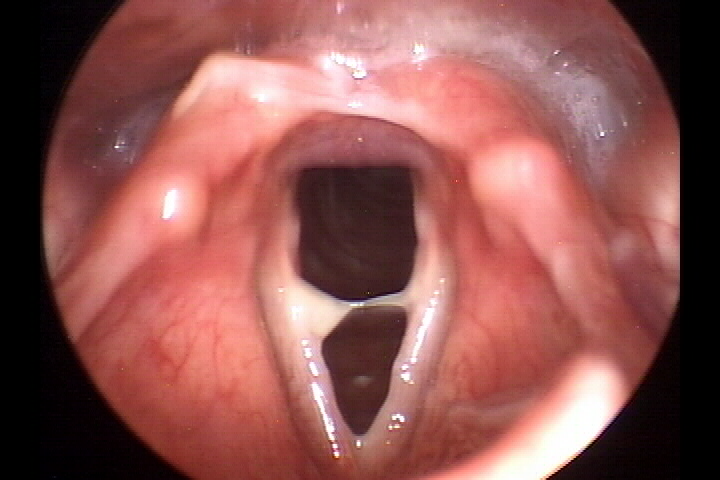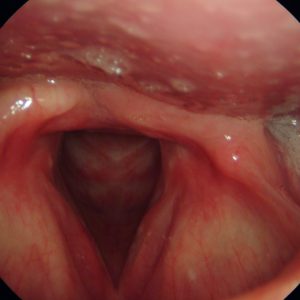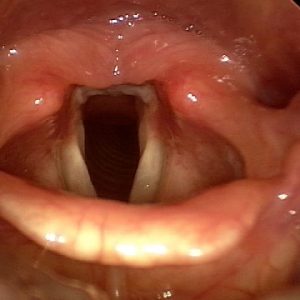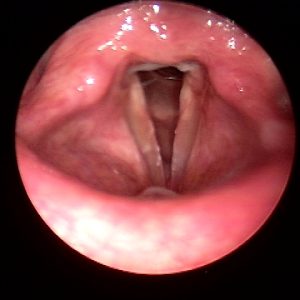Acute laryngitis occurs when the vocal cords become swollen and irritated, leading to hoarseness, throat discomfort, and sometimes a dry or mildly productive cough. Viral infections, similar to the common cold, may cause it. Still, it can also result from voice overuse (like yelling or singing too much), allergies, acid reflux, or exposure to smoke and pollution. When the vocal cords swell, they vibrate differently, making the voice sound raspy or weak.
Most cases of acute laryngitis resolve independently within a week or two. Resting the voice, staying well-hydrated, using a humidifier, and avoiding irritants (such as smoking and alcohol) can help with recovery. Over-the-counter pain relievers and throat lozenges may also provide relief. If hoarseness lasts longer than two weeks, seeing a doctor to rule out more serious conditions is important. In some cases, bacterial infections may cause laryngitis, requiring antibiotics, though this is less common. If left untreated, repeated episodes of acute laryngitis can contribute to chronic voice problems.
If the voice does not improve after two weeks, a laryngologist should evaluate the vocal fold function for vocal fold bleeding.

Acute Laryngitis
Chronic laryngitis is long-term inflammation of the vocal cords that causes ongoing hoarseness, throat discomfort, and voice fatigue. Unlike acute laryngitis, which usually resolves in a few weeks, chronic laryngitis persists for months and often results from repeated irritation. Common causes include smoking, long-term exposure to air pollution, chronic acid reflux (where stomach acid irritates the throat), frequent alcohol consumption, and vocal strain from excessive speaking or singing. Some medications, like inhaled steroids for asthma, can also contribute to chronic laryngitis.
Symptoms include persistent hoarseness, a dry or sore throat, a feeling of a lump in the throat, and increased effort needed to speak. The voice may sound deeper, rougher, or more strained than usual. If left untreated, chronic laryngitis can lead to lasting damage, including thickening of the vocal cords, scarring, and even developing vocal nodules or polyps. Treatment depends on the cause: quitting smoking, managing acid reflux, staying hydrated, avoiding irritants, and using proper vocal techniques can help. A specialist may recommend voice therapy or other medical treatmentsif symptoms persist.

Chronic Laryngitis
Reflux laryngitis happens when stomach acid travels into the throat and irritates the vocal cords, leading to inflammation, hoarseness, and discomfort. This condition is different from regular acid reflux (GERD) because it doesn’t always cause heartburn. Instead, patients often experience symptoms like frequent throat clearing, a persistent cough, a sensation of something stuck in the throat (Globus sensation), and voice changes.
Acute reflux laryngitis may occur occasionally, such as after overeating or drinking alcohol late at night. It usually resolves within a few days with simple changes like avoiding acidic foods, eating earlier in the evening, and sleeping with the head elevated. However, chronic reflux laryngitis happens when acid exposure becomes a long-term issue, leading to ongoing damage to the vocal cords. Over time, this can cause thickening of the vocal cords, constant throat irritation, and difficulty speaking.
Treatment involves dietary and lifestyle changes, such as avoiding spicy, acidic, or fatty foods, quitting smoking, and maintaining a healthy weight. Doctors may also prescribe acid-reducing medications like proton pump inhibitors (PPIs) for long-term control. If untreated, chronic reflux laryngitis can contribute to lasting vocal scarring and permanent voice loss.

Laryngeal Pharyngeal Reflux (LPR)

Severe Laryngeal Pharyngeal Reflux
Radiation laryngitis is a condition that affects people who have undergone radiation therapy for cancer in the head and neck area. While radiation helps destroy cancer cells, it can also cause long-term damage to healthy tissues, including the vocal cords. Radiation-related laryngitis leads to hoarseness, a weak or breathy voice, and, in severe cases, difficulty speaking. Early on, radiation can cause swelling and irritation, but over time, the vocal cords may become stiff and scarred, limiting their ability to vibrate correctly.
Symptoms of radiation laryngitis can appear weeks, months, or even years after treatment. People may notice their voice becoming progressively weaker, rougher, or more effortful. Some may experience dryness and a constant need to clear their throat due to reduced saliva production. Treatment focuses on maintaining vocal health through hydration, humidifiers, and gentle vocal exercises. Speech therapy can help patients adapt to voice changes and develop techniques to reduce strain. Treatments like steroid injections or voice implants may sometimes improve vocal function.
Candida laryngitis is a fungal infection of the vocal cords caused by an overgrowth of Candida, a type of yeast that naturally exists in the body. It is most commonly seen in people using inhaled steroid medications for asthma or COPD, those with weakened immune systems, or individuals who have recently taken antibiotics, which can disrupt the body's natural balance of microbes.
Symptoms of candida laryngitis include persistent hoarseness, throat discomfort, difficulty speaking, and sometimes white patches on the vocal cords or throat. Unlike bacterial infections, it does not cause fever, but the voice may feel weak and strained. Sometimes, it is mistaken for chronic laryngitis or other conditions because the symptoms overlap.
Treatment usually involves antifungal medications. If the infection is linked to inhaled steroids, patients may be advised to rinse their mouth and throat after using their inhaler to reduce the risk of fungal overgrowth. Improving overall immune health, staying hydrated, and avoiding unnecessary antibiotic use can also help prevent candida laryngitis from recurring.

 YouTube Channel
YouTube Channel
